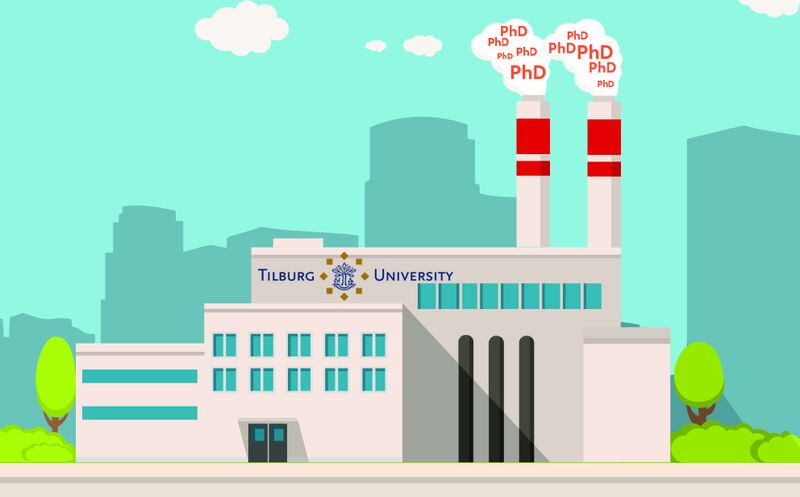
- Research
- 13/09/2018
The radio program Argos recently revealed that in recent years Tilburg University has secured hundreds of thousands of euros by supervising a strikingly large number of external doctoral candidates. These are researchers without a contract who make little use of the facilities, but who earn the university money: 70 to 90 thousand euros per PhD certificate. Tilburg was a ‘PhD factory’, concluded Argos.
The university even released a professor from other duties so that he could devote himself entirely to the supervision of external doctoral candidates. Over the course of six years he is supposed to have helped no fewer than 77 scientists obtain their doctorate. This is more than 12 a year. By comparison: other professors in Tilburg supervise on average 0.8 doctoral candidates per year, according to Argos.
The program arranged for the Groningen professor Bram Buunk to examine six theses written by external doctoral candidates at Tilburg by way of a random sample. “Substandard”, was his verdict, some “seemed like diaries”.
Investigation
As early as last week, member of the Dutch Lower House Frank Futselaar (SP) asked Minister Ingrid van Engelshoven during question time for an investigation into the theses, and coalition party VVD endorsed the idea. “The question at hand, I think, is simply whether the quality of the doctoral research - and the academic independence we expect that to involve - meet the same standards as those for ‘internal doctoral candidates’,” said Judith Tielen MP.
But before this step is taken, the minister is keen to talk to all the parties involved to find out how the supervision and assessment of external doctoral candidates is organized. Only once it is evident there is something wrong with the procedure, will the quality of the theses themselves perhaps be examined.
That seems like a good idea to president Anne de Vries of the PhD Network of the Netherlands (Promovendi Netwerk Nederland) : “If only for the PhD holders involved. After all, the awarding of their doctorate has been publicly questioned.” Moreover: “If it turns out that the theses are clearly substandard, the assessment system is perhaps not watertight and so it may be that doctoral committees are not always sufficiently independent.”
Responsibility
The theses are assessed by committees of experts chosen by the PhD candidate's supervisor. That too was striking in Tilburg: these committees were staffed repeatedly by the same individuals, many of them from the American Taos Institute, with which many of the external doctoral candidates had connections.
There is no umbrella organization keeping an eye on the quality of Dutch theses. Similarly, neither the Royal Netherlands Academy of Arts and Sciences nor universities association VSNU sees this as being their responsibility. Accordingly, this is something neither wishes to discuss. The conferral of doctorates? That's a matter for the departments, they say.
Money back?
And if people have knowingly been up to no good? Then Tilburg should repay the doctoral bonuses it has received, believes CDA parliamentary representative Harry van der Molen. “The bonus is intended in part for work such as the supervision of PhD candidates. If it turns out that individuals have received little or no supervision, this work has not been performed and the minister must be able to claim back the money,” says Van der Molen.
PNN president Anne de Vries has her doubts: “The doctoral bonus cannot be intended only for supervision, that would make it very generous indeed. But if it is proven that the quality of the theses is substandard and that therefore individuals have been awarded a doctorate without justification, then the university has indeed received money wrongly.”
Only Tilburg's problem?
For the rest, it is not known whether this problem is confined to Tilburg. De Vries fears not. “The point is that no one has oversight of external doctoral candidates. We do not even know how many of them there are.” In fact, this is one of the issues the minister will be investigating. De Vries is eagerly awaiting the findings.
Like to know more? Univers, the news site of Tilburg University, has opened a dossier on this issue.
Discussion